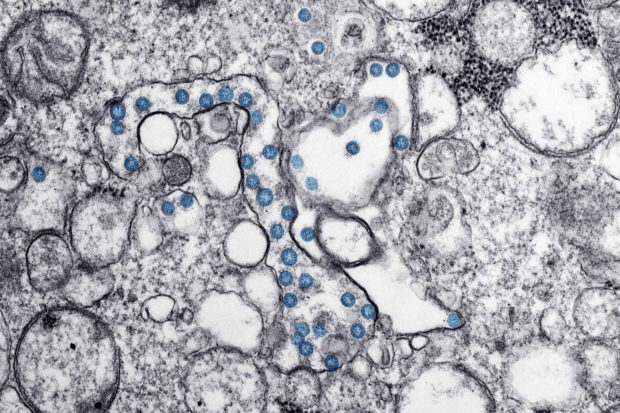Some patients who died of COVID-19 in Indonesia experienced ‘happy hypoxia’

An isolate from the first United States case of COVID-19 is seen in a transmission electron microscopic image obtained from the Centers for Disease Control (CDC) in Atlanta, Georgia, US, on March 10. (Reuters/CDC/Hannah A Bullock and Azaibi Tamin)
JAKARTA — Patients who recently died of COVID-19 in Banyumas, Central Java in Indonesia experienced an unusual coronavirus effect of “happy hypoxia”, in which they had dangerously low oxygen levels in their blood yet showed no usual symptoms of the disease, kompas.com has reported.
Banyumas Regent Achmad Husein said on Tuesday that three out of seven patients who succumbed to the coronavirus disease “seemed to be just fine and showed no symptoms of COVID-19, such as a cough, runny nose or high fever, but their oxygen saturation had slowly dropped [without them knowing it].”
Oxygen saturation refers to how much oxygen hemoglobin is carrying. It is measured in a percentage, scored out of 100.
The regent said the patients’ oxygen saturation had dropped to 75 percent, below the normal level of 90 percent or more. He urged the public to be more aware of the newly discovered symptom of COVID-19.
The official further suggested that relevant authorities measure oxygen saturation in addition to temperature checks.
Article continues after this advertisement“We’ve got to have more tools to measure oxygen saturation,” he said as quoted by kompas.com on Wednesday.
Article continues after this advertisementBanyumas has reported 253 confirmed COVID-19 cases, with seven fatalities.
Various reports say people with happy hypoxia, also known as silent hypoxemia, have oxygen levels low enough to cause them to lose consciousness or die. A healthy person typically has an oxygen saturation of at least 95 percent but doctors are reporting lower oxygen percentage levels in people that have contracted the coronavirus.
The particular problem with oxygen uptake is apparently associated with damaged lungs, meaning the more lungs are damaged, the lower oxygen level in blood. The oxygen level can be measured through a test called “pulse oximetry” that uses a sensor placed on fingertips.
For more news about the novel coronavirus click here.
What you need to know about Coronavirus.
For more information on COVID-19, call the DOH Hotline: (02) 86517800 local 1149/1150.
The Inquirer Foundation supports our healthcare frontliners and is still accepting cash donations to be deposited at Banco de Oro (BDO) current account #007960018860 or donate through PayMaya using this link.